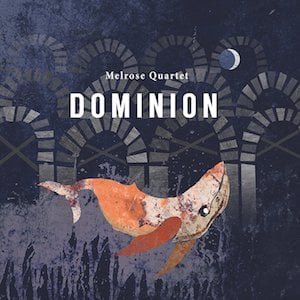 Melrose Quartet – Dominion
Melrose Quartet – Dominion
MQCD Via Proper Distribution – 13 November 2017
The Melrose Quartet embody the kind of collaborative spirit and socially aware stance that makes folk music such an interesting, challenging and continually relevant form. Based in Sheffield, the band is made up of two married couples – fiddler Nancy Kerr and Australian bouzouki expert James Fagan, and Jess and Richard Arrowsmith (fiddle and melodeon). It is three years since their acclaimed debut, Fifty Verses, and in that period all of the members have recorded and performed in various guises, but it’s good to have them all back in one place.
To the uninitiated, or rather to those who are aware of the sum of the parts but not of the whole band, the musical possibilities of the Quartet are tantalising. Kerr and Fagan have formed a longstanding creative partnership: her fiddle playing and vocal skills are uniquely offset by his bouzouki – still one of the most underused and underappreciated instruments in folk, in my opinion. Add to this the sheer range of Richard Arrowsmith’s talents (he is a member of Morris side Pecsaetan and metal/ceilidh crossover band Glorystrokes) and Jess’s ability as a singer, musician and a songwriter, and you’ve got a mouthwatering concoction.
With all that impressive musical heritage vying for position, it may come as something of a surprise that many of Dominion’s finest and most striking moments are ostensibly simple unaccompanied compositions. The album’s opening track, the a cappella Mariah’s Gone, is an Appalachian song, brought into the limelight by the wonderful Jean Ritchie version, written down in 1955 but not performed until 1971. The Quartet take their inspiration from Peter Bellamy’s 1985 interpretation and add some distinctive and brilliantly executed four-part harmonies to the mix. The low notes give a surprising musicality to the arrangement, while Jess and Nancy’s parts recall June Tabor and Maddy Prior’s work together as the Silly Sisters. The final minute of the song, the section beginning ‘trouble, trouble is my name,’ where the female voices split then converge, is particularly expressive.
The track that follows, Dominion of the Sword is altogether different but no less extraordinary. Essentially, it is James Fagan’s update of Martin Carthy’s epic ballad, and after a minimal, unaccompanied first verse, breaks into a gallop that measures up well against the urgency and alacrity of that well-known 1988 version. Here though we are treated to an extra verse, written by Fagan, that with its references to Trident and military drones brings the song right up to the uneasy present. It is further proof of folk music’s ability to change and adapt to the times without forgetting its past: after all, the arrangement is based on an old Breton pipe tune and the original ballad from which Carthy gained inspiration was first composed in the mid-seventeenth century.
A Generous Man/Carthy’s March is a more direct nod to the folk revival of the twentieth century. A Dave Swarbrick tune brought to life by the Quartet’s feel for their own instruments and each other’s playing, it feels simultaneously loose, unrehearsed and note-perfect, a brisk, lightfooted workout for fiddle, mandolin and melodeon.
Hand Me Down is the album’s first wholly new composition, written by Kerr in celebration of Richard Arrowsmith’s fortieth birthday. It is a deft exploration of the ideas of home and acceptance and features a lead vocal that goes some way to showing why Kerr was chosen as the BBC Folk Singer of the Year in 2015. Her voice is a near-perfect balance of gutsy realism, prettiness and just a hint of nostalgia.
Ware Out Mother is a traditional song first collected in Dorset, but the version here – again sung unaccompanied – adds a tough northern humour, like a cross between the Watersons and Ewan MacColl. The mood changes somewhat on Anthem of a Working Mum, Jess Arrowsmith’s subtle examination of some of the difficulties still faced by women in today’s apparently enlightened society.
Fagan’s Low Quebec is a delightful instrumental that gives a taste of the infinite, intricate possibilities of the mandolin. It is another ‘birthday song’, this time from Fagan to Jess Arrowsmith. The traditional The Seeds Of Love is another a cappella song, and another example of the group’s stunning vocal talents. Here the delivery is equal parts wistful and coquettish.
Rise No More is perhaps Kerr’s tour de force. A heartfelt elegy for the British manufacturing industry – in particular, Sheffield’s history as the Steel City – it stands as an effigy to the past without ever romanticising it. The imagery Kerr uses when describing a long-disused forge is especially moving. Despite its rather sombre subject matter the song, like much of Dominion, is rousing, almost danceable. The same cannot be said for Davy Cross, the story of a fisherman lost at sea whose body could only be identified by the unique ‘gansey’ (a type of knitted fisherman’s sweater) his widowed mother had knitted. It’s a simple, extremely personal and ultimately heartbreaking song full of detail and sung with restraint.
But again the album makes a bold switch in mood. The Gallery/The Venus Of Levenshulme is a pair of dance tunes learned by Jess Arrowsmith from Si Heywood and played with raucous abandon, the fiddles spiralling and entwined. Good Intentions is brief, little more than a fragment of a song, but it packs quite a harmonic and emotional punch into its two minutes, while the instrumental Rosslyn Castle, an old Scottish tune, is almost baroque.
Jess Arrowsmith’s Raise Your Voice provides the perfect finale: a celebration of the way something as simple as a song can bring people together, to improve social and emotional wellbeing. It also seems to act as a kind of creation myth for the band itself (like The Mamas and the Papas’ Creeque Alley), and its chorus ‘Raise your voice with mine/for now’s the perfect time to join the song’ could easily be the Melrose Quartet’s mantra. This is a band who have prospered by seizing the day, by daring to do things that are slightly different, a band who are able to make old songs sound new, and new ones sound timeless.
Dominion is out now. Order via ProperMusic | Amazon | iTunes
Melrose Quartet “Dominion” Album Launch Tour
Photo Credit: Lizzy Doe

